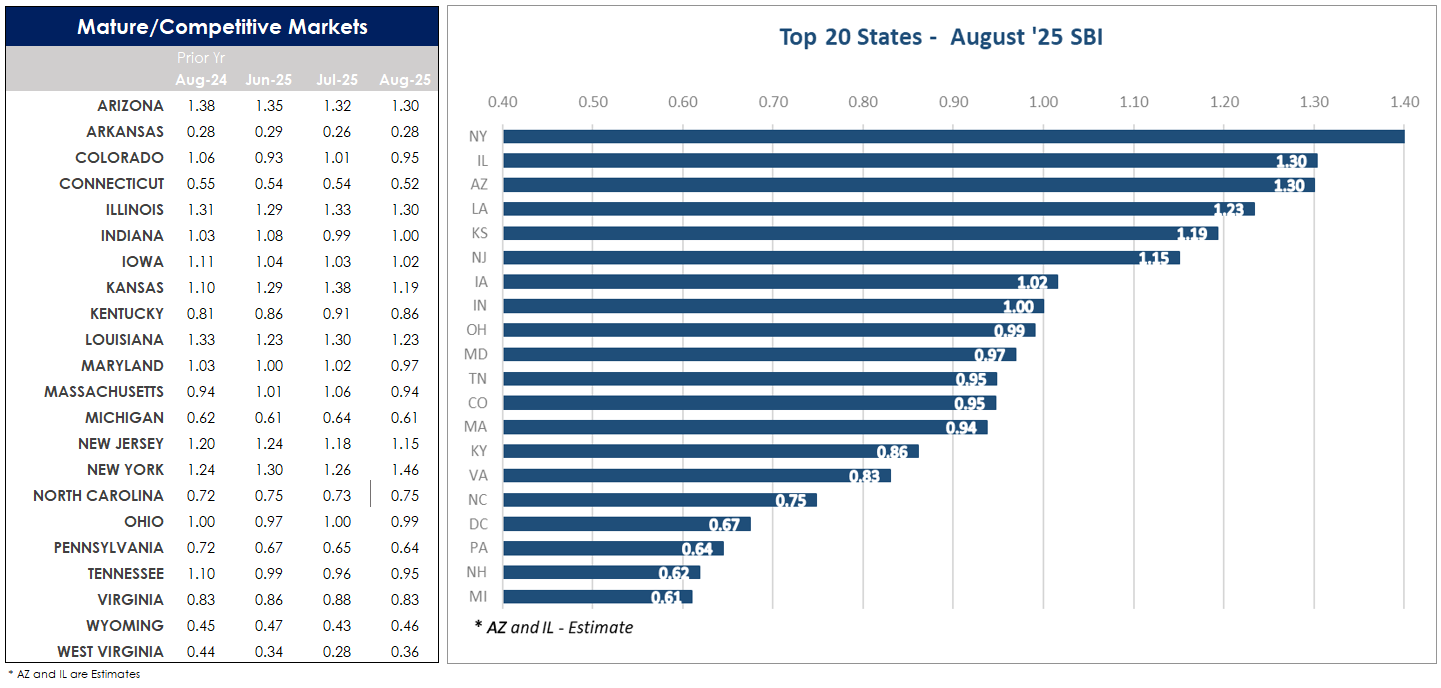RubinBrown Sports Betting Index: August 2025 Analysis
RubinBrown Sports Betting Index: August 2025 Analysis
August Sports Betting Index (SBI) - Growth Amid Shifting Competitive Boundaries
In the chart below, we present our RubinBrown Sports Betting Index (SBI). The SBI is based on our proprietary index of the leading sports betting states in the U.S. To continue to best reflect current market conditions, we’ll occasionally adjust the components of the index. To better compare competitive conditions, our index numbers focus in on a group of mature, competitive states. Therefore, a state with an index score of 1.15 had a raw index score of 15% greater than the average, while a 0.90 index score shows a 10% lower than average result.
LEARN MORE ABOUT THE RUBINBROWN SBI

August 2025 was another strong month for U.S. sports betting, with continued expansion across most regulated markets. National handle and revenue both posted solid year-over-year gains, reflecting the sustained maturity and depth of the legal wagering ecosystem. New York led all jurisdictions with a 42% YoY handle increase, from $1.44 billion to just over $2 billion, marking its strongest performance of the year. Its 1.46 SBI rating also represents the highest monthly index across all states in 2025 to date.
Yet even against this robust backdrop, industry observers remain alert to developments outside the traditional regulated framework. The recent surge in activity across daily fantasy, sweepstakes, and prediction market platforms underscores a shifting dynamic that challenges the regulatory perimeter of what constitutes sports wagering. While these models have attracted capital and users at a rapid pace, they also operate in legal gray zones where consumer protections, tax contributions, and long-term compliance stability remain uncertain. For firms deeply rooted in licensed operations, this divergence represents not only a competitive variable but also a growing policy and integrity concern.
PrizePicks’ $2.5B Valuation: Innovation Meets Regulatory Tension
The announcement that Allwyn would acquire approximately 62% of PrizePicks at a valuation of $2.5 billion upfront (rising to $4.15 billion with performance earnouts) drew widespread attention across the gaming industry. The size of the deal is significant, particularly for a company that operates primarily through a daily fantasy framework rather than as a licensed sportsbook.
From a financial standpoint, the transaction values PrizePicks at roughly 7.4x current EBITDA ($339 million), potentially climbing to 12.2x if future targets are met. Compared to public sportsbook operators such as DraftKings or Flutter Entertainment, which often trade at 25x–60x forward multiples, the relative discount reflects the premium that public markets still attach to full licensure, transparent reporting, and long-term regulatory certainty.
However, the deal also reflects investor appetite for companies that can innovate quickly and achieve profitability outside the burdens of traditional compliance costs. This is where caution is warranted. The ability of companies like PrizePicks to move fast and reformat products highlights the ongoing tension between market demand and regulatory oversight. While such agility can yield short-term growth, it also exposes firms to evolving interpretations of gaming law and potential enforcement risk as regulators catch up to new product structures.
The Event Market Dimension
Another factor driving valuation speculation is the company’s embedded option value around event-driven markets. PrizePicks’ acquisition of a Futures Commission Merchant (FCM) license enables it to interface with Designated Contract Markets (DCMs) like Kalshi or Polymarket, opening the door to broader prediction-based trading. While no such partnership has yet materialized, the possibility of expanding from fantasy sports into regulated event contracts covering entertainment, politics, or economic outcomes represents a longer-term strategic lever.
Moreover, should regulators outside of sports betting ultimately permit the inclusion of sports outcomes within approved event markets, the competitive lines between regulated sportsbooks and derivatives exchanges would blur significantly. This would raise difficult policy questions around disclosure standards, data integrity, and consumer safeguards - issues the regulated sector has spent years developing robust frameworks to address.
A Cautious Takeaway for the Industry
The PrizePicks transaction underscores both the vitality and volatility of the current sports wagering landscape. It demonstrates that profitability and innovation can attract substantial investment even outside the licensed sportsbook model. But it also serves as a reminder that operating beyond regulatory guardrails carries inherent risk not only for companies but for the broader integrity of the gaming ecosystem.
As regulators, investors, and operators continue to navigate this evolving environment, the strategic challenge will be balancing innovation with compliance. Long-term enterprise value in the U.S. wagering sector has historically favored those who align with stable regulatory frameworks. The gray market may offer speed, but it rarely offers permanence.

Published: 10/09/2025
Readers should not act upon information presented without individual professional consultation.
Any federal tax advice contained in this communication (including any attachments): (i) is intended for your use only; (ii) is based on the accuracy and completeness of the facts you have provided us; and (iii) may not be relied upon to avoid penalties.